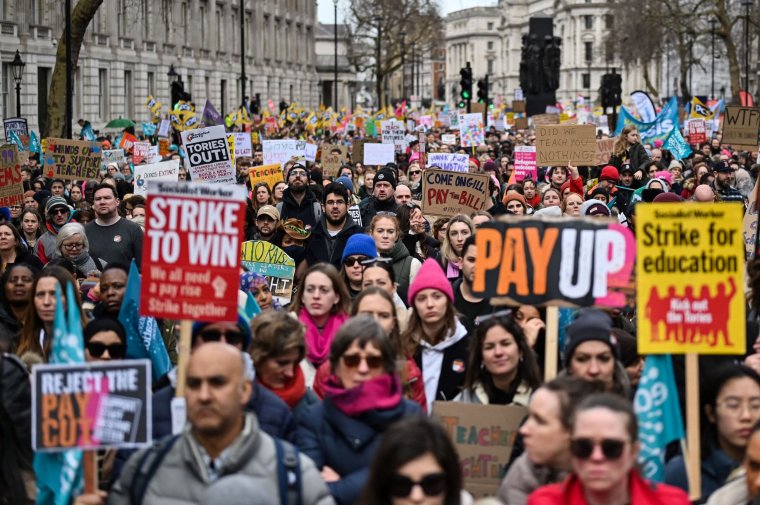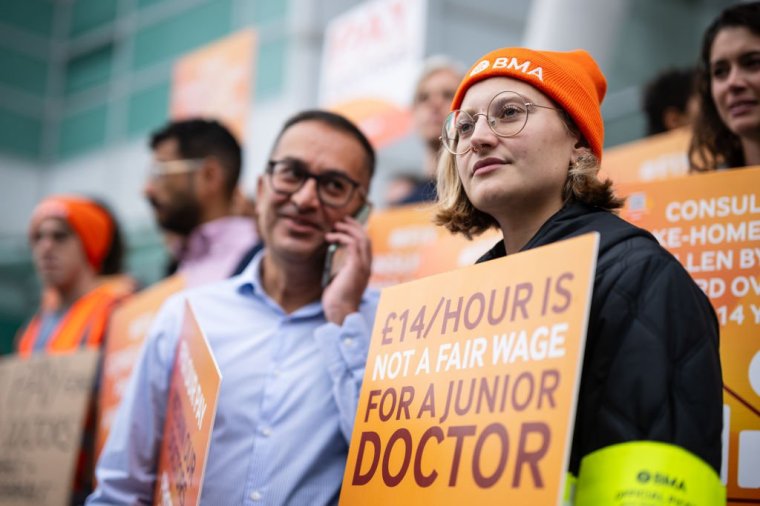NHS and School Strikes Loom as Pay Rises Fail to Match Inflation
The NHS and schools are set for another round of strike actions following warnings from unions.
pay rises for staff
were not high enough.
Staff members throughout the public sector, excluding high-ranking civil servants, will be provided with
above-inflation pay increases
This year, following the acceptance of almost all the suggestions made by independent pay review boards.
However, two unions suggested they might consider taking industrial action over the
settlements
While many others cautioned that the funds would not compensate for the actual loss of wages due to inflation and urged officials to revisit the bargaining table.
Warnings were issued that educational institutions might face fiscal challenges as it became clear they would need to cover 1 percent of a 4 percent increase in teacher salaries directly using funds already stretched thin within their budget constraints.
The pay raises exceeding inflation are all above the 2.8 percent allocated by Rachel Reeves, which means that Cabinet ministers will need to reallocate funds within their respective departments to cover these hikes.
The Institute for Fiscal Studies (IFS) has forecasted that the Chancellor will face challenging choices during her upcoming spending review next month, cautioning that officials may find it difficult to sustain elevated salary increases in the coming years.
Physicians, dentists, educators, correctional officers, wardens, and judges will each see a salary increase of 4 percent, whereas other healthcare workers within the National Health Service, such as nurses, will be granted a raise of 3.6 percent, both exceeding the present inflation rate of 3.5 percent.
Senior military officials will get a 3.75 percent increase, while senior civil servants will receive a 3.25 percent raise.
Residents – previously referred to as junior doctors – along with trainee dentists, will be receiving an additional one-time payment of £750 aimed at encouraging them to remain in their professions.

Frustration follows directive for schools to cut costs
Institutions will need to finance part of the salary increases for teachers using their internal funds, which could lead to additional reductions within the education sector.
The Education Secretary, Bridget Phillipson, stated that schools should aim to cover the initial 1 percent increase in teachers’ salaries, estimated at around £400 million by the IFS, through enhanced efficiency and better financial management to ensure optimal use of funds.
She stated, “Some may argue that this is unachievable; however, I feel that educational institutions, similar to other parts of the public sector, hold an obligation to guarantee their resources are utilized with maximum efficiency.”
Teachers’ associations cautioned that this would push numerous schools into fiscal distress.
The National Education Union (NEU), which is England’s biggest teachers’ union, has warned they might “formalize their disagreement” – a step just before taking industrial action.
strike action
— with the Government unless they fully fund the salary increase for teachers.
Daniel Kebede, the NEU general secretary, contended that due to the pay award being “inadequately funded,” schools would encounter “reductions in services… potential layoffs, and increased workloads for an overburdened workforce.”
He stated: “If the government does not pledge full funding for the salary increase, it is probable that the NEU will initiate a formal disagreement.”
Matt Wrack, who acts as the general secretary for the National Association of Schoolmasters Union of Women Teachers (NASUWT), stated: “It is crucial to have sustained investment in education. There is a significant danger that numerous schools could face extreme financial strain within this year and the coming one unless any current budget gaps are supplemented with additional funds.”
The NASUWT has proposed terminating fossil fuel subsidies, tackling the ” billions in taxes uncollected by HMRC,” and implementing a 2 percent wealth tax on assets valued at more than £10 million as potential measures to “entirely finance” the salary increase.
Pepe Di’Iasio, the general secretary of the Association of School and College Leaders, stated that the agreement signifies “an additional reduction in school funding.”
He stated, “If the Administration believes that closing this financial shortfall can be achieved via ‘enhanced efficiency and better budgeting,’ they are misguided.”
Schools have already devoted numerous years reducing expenses to an absolute minimum and even further.
Read Next:
NHS summer strikes approach as healthcare workers reach ‘tipping point’
The GMB union, representing school support personnel, called it a “scandal” that educators received a 4% raise while teaching assistants, cafeteria workers, administrative employees, and janitors were initially only offered a 3.2% increase.
The research conducted by the union, representing over 100,000 educational support personnel nationwide, indicates that teaching assistants receive an average yearly wage of only £17,000.
Stacey Booth, GMB National Officer, stated: “School support staff are the unsung heroes who take care of our children, provide their meals, and foster their development.”
They receive staggeringly low wages, and it’s outrageous that this salary decision will push them even farther below the pay scale of educators.
Our members are calling for equality with teachers. This is yet another undeniable indication of why it’s crucial to reintroduce the School Support Staff Negotiating body at the earliest opportunity.
Physicians caution about potential additional walkouts
The British Medical Association (BMA) has suggested potential additional strikes following their characterization of the 4 percent pay increase for doctors as “grossly insufficient.”
BMA council chair Professor Philip Banfield urged Health Secretary Wes Streeting to “come to the negotiating table and start talking if he wants to head off an escalation in disputes and reverse the workforce crisis”.
He stated: “The Health Secretary can prevent industrial action by entering into negotiations with us and committing to a path for complete salary restitution.”
As things currently stand, resident doctors have justified their choice to declare a voting process for potential industrial actions set to begin later this month. This is due to the fact that Mr. Streeting has not yet committed to significantly reinstating their salaries.
The BMA’s committee for junior doctors has made their stance quite evident: the sole approach to prevent strike actions is through complete reinstatement of physicians’ salaries.
No one desires a recurrence of physicians standing on picket lines; our preference is to work within hospitals, general practitioner offices, or community settings, treating patients and enhancing public health—but unfortunately, today’s government actions have made this outcome seem much more probable.
The associate director of the IFS, Ben Zaranko, noted that although the 3.6 percent raise for NHS employees isn’t vastly different from the 2.8 percent deemed affordable for the public sector by the government, “this difference still needs to be covered somehow.”

Salary increases spark concerns over potential budget reductions
Aside from the 1 percent increase for educators hailing from schools, cabinet members must finance salary hikes within their current Whitehall allocations. It will then be left to individual departments to determine how exactly they reallocate funds.
The i Paper
understands.
It is anticipated that the Department for Education will assist schools in reducing expenses related to purchasing and energy consumption.
Similar to other ministries, the Department of Health initially planned for a 2.8 percent budget increase; however, they have redirected additional funds to cover salary raises. This move ensures that essential front-line NHS services won’t face reductions, according to internal sources.
This involves simplifying its budget by merging NHSE into the department, decreasing the number of managers, and eliminating superfluous red tape.
This will include decreasing staffing levels at NHSE, lowering the operational expenses of integrated care boards, as well as trimming back office functions such as communication teams within trusts and across NHS regions.